Is Planetary Romance a Different Genre from Sword & Sorcery
The two genres are close relatives, but I do believe they are distinct.
Before diving deep into the waters of geek genre minutiae, I’d like to take a moment to thank of of my subscribers new and old. We just passed 400 subscribers and 2024 has been a year of semi-explosive growth. Thank you all for visiting, I will strive to continue to offer the wide ranging glimpses at as many corners of pop culture as I can. My interests are wide ranging and I hope you will join in on the conversation.
Now onward to the geeking out part!
Background
Back in November of 2023, I wrote a post discussing some of the peaks and valleys in quality that fans of Planetary Romance have suffered through or enjoyed over the past few years. A friend of mine read the post and noticing that the discussion of Planetary Romance included a number of references to Sword & Sorcery asked me, "what is the difference between Planetary Romance and Sword and Sorcery fiction?"
It was that conversation, combined with the fact that one of the people who responded to the essay was Sword & Sorcery advocate
prompted me to write a follow up post.
A pithy answer to my friend might be something like, "there is no magic in planetary romance, and it usually takes place 'off planet.'" This definition is useful, as far as it goes, but it doesn't go deep enough to truly differentiate the two sub-genre from each other.
That answer is also only a half truth because there is often magic, or near magic, in Planetary Romance stories. For example, there is mentalism in the John Carter books that borders on magic, the Northwest Smith tales of C.L. Moore contain their fair share of the seemingly supernatural and feature adversaries inspired by Gorgons (the traditional and not D&D “bull” variety) and Vampires, and the Saga of Pliocene Exile is a pseudo-planetary romance saga that takes place in Earth’s past features psionic abilities as well. In fact, it is the combination of “transportation to another world” and psionics that makes me classify the Saga of Pliocene Exile as planetary romance rather than SF or Space Opera which also shares qualities with Planetary Romance.
All of these examples combined to make me realize that further discussion of Planetary Romance and Sword and Sorcery makes for a perfect topic for a longer post.
It’s Definition Time!
So...what is the difference between Planetary Romance and Sword and Sorcery fiction?
To begin, we must start by acknowledging that both of these subgenre of fiction lie within the scope of Heroic Fantasy -- and sometimes Heroic Science Fiction -- which are themselves subgenre of Fantasy literature. I understand that saying Science Fiction is a sub-genre of Fantasy is in and of itself a controversial statement, but all of these terms have a bit of wiggle room and being controversial allows for more future posts. What is “Heroic Fantasy” after all?
When it comes to clear definitions of genre conventions, we have not come far from the mid-20th Century when luminaries like Michael Moorcock, Fritz Leiber, and L Sprague De Camp explored the topic in the pages of various fanzines. As an example, we can see how Michael Moorcock responded to a question about the nature of Heroic Fantasy in the pages of the Conan fan community zine Amra in 1961.
Moorcock’s comments about the nature of Heroic Fantasy demonstrate that an understanding of genre classification is a challenging task, especially when for most of human history people just classified these things as “stories.” People didn’t listen to the Odyssey or Iliad and think to themselves, “ah yes, what a wonderful Epic and quite a contrast to the 90 minute long fart joke Aristophanes wrote in his Fantasy Realism story The Clouds.” The Golden Age of Greece may have been a high point in literary criticism, we do still read Plato’s writings on Rhetoric1 and Aristotle’s Rhetoric and Poetics today, but they were not as big on genre classification as we are today.
I could use this as an opportunity to advance the argument that in "speculative fiction" it is Fantasy that is the primary genre and all other classifications are subgenre of Fantasy, but as I mentioned above that is a discussion for another post and the freelance author’s bane is finding topics for exploration and when you find one you stretch it as much as you can.
Let me merely state that in general I dislike the term "speculative fiction" as it seems to:
Have an anti-fantasy bias
Exhibit "embarrassment" with association with Fantasy
Have a pro-Science Fiction bias (SF is the abbreviation for both)
Additionally, it is guilty of a litany of other sins including the theft of candy apples from small children at county fairs. The term speculative fiction also tends to be used by those who use the term “Skiffy” as a pejorative for whimsical science fiction and who favor a “kind of books you are supposed to like” list akin to the “movies you are supposed to like” list I so despise.
But I’ve already gone further down the rabbit hole than I wished, back to Heroic Fantasy.
For the purposes of this particular discussion, I’ll give Heroic Fantasy a brief and reductive definition that is serviceable but incomplete. The genre deserves a thorough examination itself, but that will have to wait for an essay focused on the broader genre. For the sake of today’s discussion, Heroic Fantasy can be defined as narratives in which a heroic figure struggles against antagonists within an imagined setting that contains "impossible" or "improbable" elements. These elements can be magic, monsters, imagined science, or gobbledygook.
Most of the fiction in modern Fantasy, epic or otherwise, is some form of Heroic Fantasy even when the stories contain "mundane" protagonists or "anti-heroes." To be Heroic Fantasy in its pure distilled form, the protagonist must be larger than life. This larger than life requirement is even more true in the sub-genres of Planetary Romance and Sword and Sorcery.
Heroic Fantasy can be defined as narratives in which a heroic figure struggles against antagonists within an imagined setting that contains "impossible" or "improbable" elements.
Though I believe the genres are distinct, they are still more tales of action than introspection. That doesn’t mean that they are free from introspection, the first Conan story contains a treatise of the value of the poet, but it does mean that the focus is on action.
Since I’ve demonstrated how difficult it is to come up with a unique and useful definition of Heroic Fantasy in my very reductive definition above, I’m going to see how established experts in the genre have defined these categories and use those as the basis for further discussion.
Established Definitions
Planetary Romance
According to David Pringle (in John Clute and John Grant's Encyclopedia of Fantasy) Planetary Romance stories,
are stories of adventure set almost entirely on the surface of some alien world, with an emphasis on swordplay (or similar), monsters, telepathy or other under-explained "magic," and near-human alien civilizations which often resemble those of Earth's pre-technological past...The hero is usually from Earth, but the means of his or her "translation" to the far planet is often supernatural rather than technological, involving flying carpets, astral projection, angel-power and kindred devices. Spaceships are sometimes mentioned, but the complete lack of interest shown in the mechanics of space travel is one of the principal features distinguishing PR from space opera...; super-scientific spacecraft and other mighty machines are central to space opera, but rarely feature in planetary romance.
Sword & Sorcery
The same volume includes a definition of Sword and Sorcery written by John Clute, David Langford, and Roz Kaveney which claims,
In 1961 Michael Moorcock requested a term to describe the fantasy subgenre featuring muscular Heroes in violent conflict with a variety of Villains, chiefly Wizards, Witches, evil Spirits, and other creatures whose powers are -- unlike the hero's -- supernatural in origin. Fritz Leiber suggested "Sword and Sorcery", and this term stuck.
I think these two definitions are extremely useful and one might argue that the Pringle and Clute definitions provide us enough specificity to give us a solid foundation for a clear understanding of these two genre.
Commentary on Sword & Sorcery Definition
I am not quite satisfied with Clute's definition of Sword and Sorcery. For one, I don’t think that “muscular Heroes” are a necessity. Some of my favorite Sword and Sorcery characters are far from muscular (Elric, Morlock Ambrosius) and who often have to rely on guile to overcome their foes. Not only that, but there are several Sword & Sorcery protagonists with powers of supernatural origin. I mention these quibbles not to discredit the Clute definition, but to highlight how difficult it is to create an accurate definition. I will add though that it was not Michael Moorcock who requested the term. It was likely George Heap who began the conversation in his short lived fanzine Ancalagon who wrote the following in the introduction to Issue 1.
Moorcock’s proposal for a definition came in Issue 15 of Amra, which was published two months later in May of 1961 and Fritz Lieber’s response to Michael Moorcock in Amra #16 was a repeat of his answer in Ancalagon #2.
Commentary on Planetary Romance Definition
The Pringle definition of Planetary Romance gives us a strong sense of the kind of story one might expect if one were to call it Planetary Romance. It also provides ammunition against any claims that Planetary Romance doesn't feature magic. This is important because one of the things that makes Planetary Romance so special is that way that it walks the tightrope between Fantasy and Science Fiction. It is a wonderful crossover genre, so much so that it also has a definition in Clute’s Encyclopedia of Science Fiction, though I find the one in the Encyclopedia of Fantasy (above) more useful.
Some brief examples of the "magic" featured in tales of Planetary Romance include the telepathic language of the Martians of Barsoom, the psychic hounds of Leigh Brackett's Skaith novels, and the "Force" in the Star Wars films. The Star Wars films being a wonderful filmic example of Planetary Romance. Planetary Romance tales feature magic, but it is not a necessary condition for the tale and is often merely a means to an ends. What is fairly universal is the inclusion of fallen empires, dying worlds, and the ruins of once great civilizations.
The obsession with fallen empires, dying worlds, and ruins of once great civilizations is one shared with the Sword and Sorcery genre. The dying planet of Barsoom shares a great deal with Robert E. Howard's use of lost cities in Conan stories. Though one should note that the empires of Sword and Sorcery are dead empires they are dead empires of a different sort than is typical in Planetary Romance. In Planetary Romance, the fallen civilizations are often artifacts from a "more noble" time. In Sword and Sorcery, civilization itself must fall as it corrupts the natural man with its decadence and the fallen empires fell to this corruption. This is one distinction between the genre, the 19th century moral clarity of Planetary Romance is often in direct opposition to the 20th century pessimism of Sword and Sorcery fiction.
But it is more than a pessimistic world view that separates the two genres. Sword and Sorcery tales contain within them elements of the Weird Horror tale. Michael Moorcock is a master of Sword and Sorcery whose Elric character perfectly embodies the Sword and Sorcery obsessions with cultural decadence and Weird Supernatural Horror. He described Conan's relation to his world (and to prior Heroic Fantasy characters) in Wizardry and Wild Romance (1987) as follows: "If the form of Howard's stories was borrowed at third and fourth hand from Scott and Fenimore Cooper, the supernatural element from Poe and others, the barbarian hero of the Conan stories owed a great deal to Tarzan and other Burroughs privatives. Given to impulsive violent action, sudden rough affection and bouts of melancholy...Conan mistrusted civilization. He was forever at odds both with the respectable world and the occult world; forever detecting plots to seduce him." [emphasis mine]
In Heroic Fantasy in general, and Planetary Romance in particular, magic can be a tool that is neutral in its use. The "Force" has both a light side and a dark side, the telepathy of Martians isn't in itself corrupting. In Sword and Sorcery tales magic is by its nature a corrupting force. Conan fears and opposes magic, even the anti-Conan Elric eschews its use whenever possible and the use of magic rituals often comes with a great cost.
Notice the use of the word "fear" when describing Conan's reaction to magic and the supernatural. Howard's invincible barbarian is sometimes as deathly afraid as the most frail Lovecraftian protagonist when it comes to things that lurk in the spaces between. Though the supernatural beast, "neither a hound nor a baboon," that attacks him in The Phoenix and the Sword "rouse[s] in the Cimmerian a frenzied fury akin to madness," a creature similar to Tsathaggua leaves him "frozen with nauseated horror." What is this creature that so frightens Conan, the man beyond fear? It is an "amorphous bulk...Its unstable outlines somewhat suggested an octopus, but its malformed tentacles were too short for its size, and its substance was a quaking, jelly-like stuff which made him physically sick to look at... among this loathsome gelid mass reared up a frog-like head." The creature is either Shoggoth or Tsathaggua (the fact that the creature's summoner is named Tsotha hints at the second), but it is certainly beyond the abilities of our champion to defeat this "blasphemy agains the eternal laws of nature." This is the kind of creature one would not expect to find in the Planetary Romance fiction of Brackett or Burroughs, but that is perfectly at home in the "dreams" of Lovecraftian horror. Horrific creatures abound in the Conan fiction, and in Sword and Sorcery generally. Fritz Leiber's Lankhmar stories have the "Gods of Lankhmar," Michael Moorcock's Elric tales feature all kinds of Weird Horror from the gods of chaos to much smaller beings.
Planetary Romance is a hopeful fantasy where heroes strive valiantly and where the hero chooses good over evil -- even at personal expense. Sword and Sorcery is a dark and nihilistic genre with a dark view of human nature where the hero often chooses self-interest over the Good. It is his firm command of this single feature distinguishing Sword and Sorcery from other Heroic Fantasy (that of the incorporation of the Weird Horror tale into Heroic Fantasy) that makes Michael Moorcock's anti-Conan stories about the tragic albino Elric so ingenious. Moorcock simultaneously deconstructs the character of Conan while writing a story that embodies the conventions -- even while it expands them -- of the Sword and Sorcery tale.
The first words readers of Howard's Conan read as a description of the archetypal character are:
"Hither came Conan, the Cimmerian, black-haired, sullen-eyed, sword in hand, a thief, a reaver, a slayer, with gigantic melancholies and gigantic mirth, to tread the jeweled thrones of the Earth under his sandalled feet."
The first words readers read as a description of Michael Moorcock's Elric are:
"His name was Elric of Melnibone king of ruins, lord of a scattered race that had once ruled the ancient world. Elric, sorcerer and swordsman, slayer of kin, despoiler of his homeland, white-faced albino, last of his line."
Both quotes are from the first published stories of the respective character, and both stories take place toward the end of the character's life. It is exquisite the way that Moorcock inverts almost every aspect of the Conan character in the creation of his anti-hero. He inverts every aspect save one, both men are prone to gigantic melancholies. One might think due to the fact that Moorcock's Elric tales are a deconstruction of the Conan character, or possibly an adult version of an adolescent character, that Moorcock would use the deconstruction as an opportunity to attack the genre itself. Moorcock doesn't. He uses it as an opportunity to refine the genre and expand it.
By removing the aspects of the genre that are adolescent wish fulfillment and focusing on the central concepts of Sword and Sorcery, Moorcock allows us to see the literary merit of the conventions of the genre free from the constraints of whimsy. The young reader, seeing the power of Conan, might miss the criticisms of society and the dark presentation of human nature that run throughout Howard’s writings. The reader of Elric's stories cannot avoid them for their terror and their beauty. In writing fiction that is a negative image of the original, Moorcock created a lens that allows readers to more greatly appreciate what Robert E. Howard has done with his Conan tales -- something that the Lin Carter and L Sprague de Camp pastiches missed -- the demonstration of how fiery human nature reacts when faced with supernatural horror. Conan often fights against the darkness, but he often flees as well.
And therein lies a central difference between Sword and Sorcery and Planetary Romance. John Carter would never flee from the giant white ape of Barsoom. He might feel some twinge of fear before he grapples with the beast and defeats it. When translucent skinned invaders from Jupiter attack, horrifying visage and all, it is John Carter who flies of to their home world to defeat them -- fearless in the face of the unnatural or the evil. Luke, when captured by Vader in Return of the Jedi, doesn't succumb to despair. Instead he sees "the good" in his father and fights to redeem a lost father. In Planetary Romance Evil can be defeated. In Sword and Sorcery some Evil is best left in the pit where you found it.
Conclusions
I don’t know if I’ve actually demonstrated the differences between Planetary Romance and Sword & Sorcery fiction, but I think I’ve added a lot of food for thought. What, if any, do you think the major differences are?





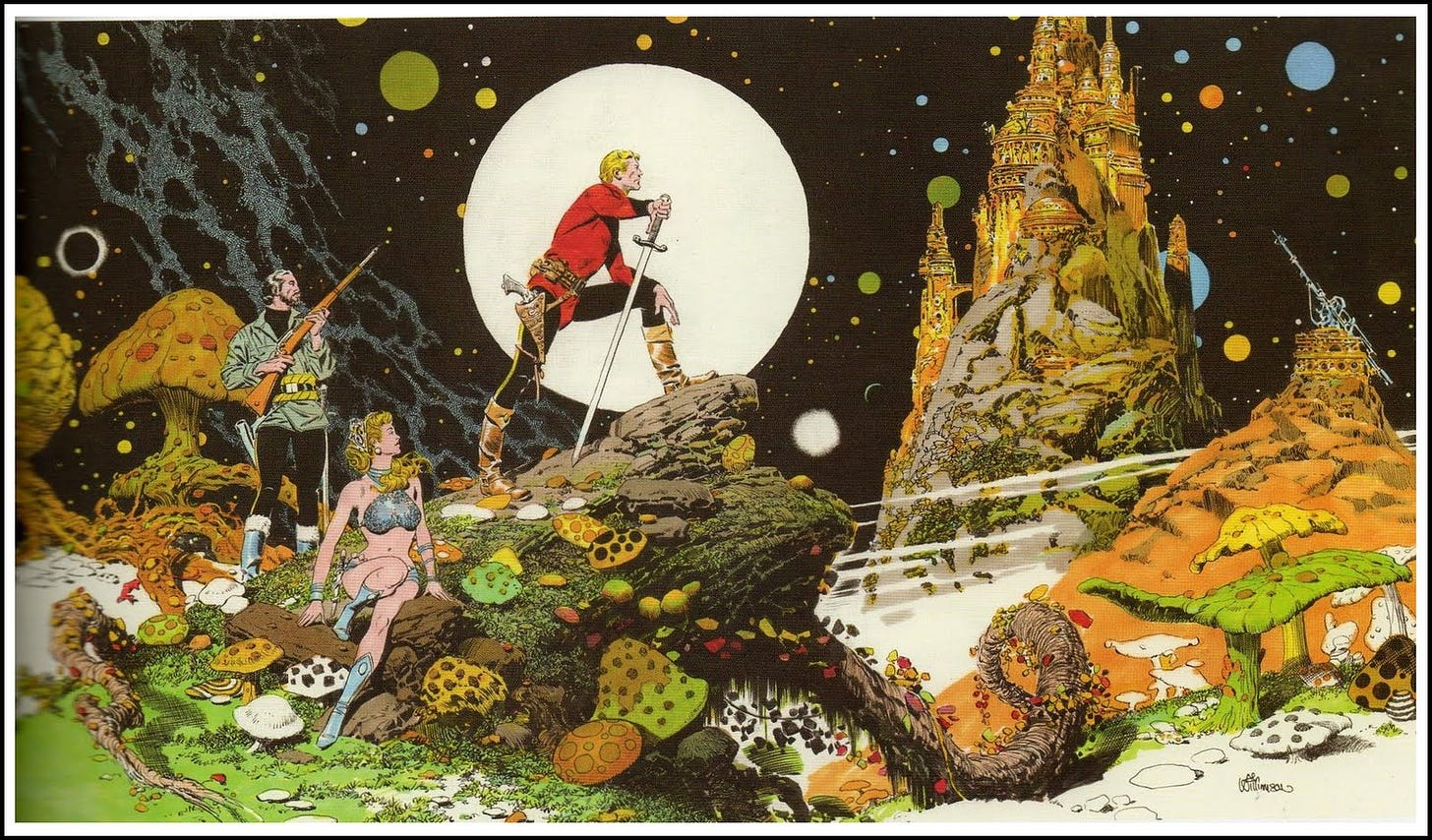
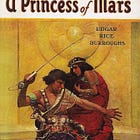
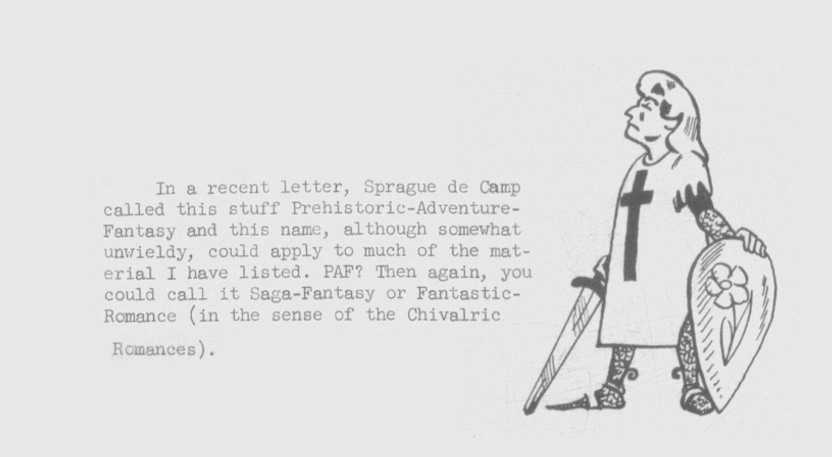
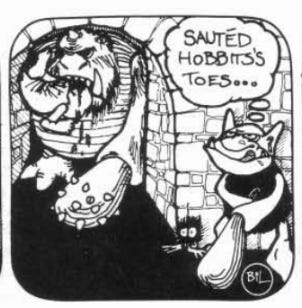
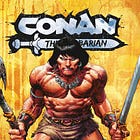
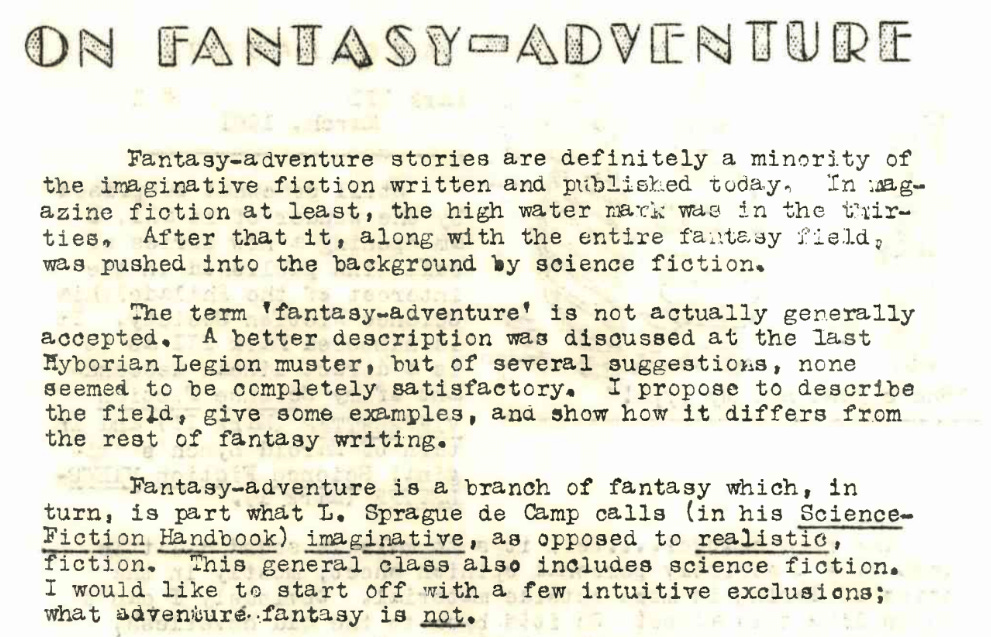
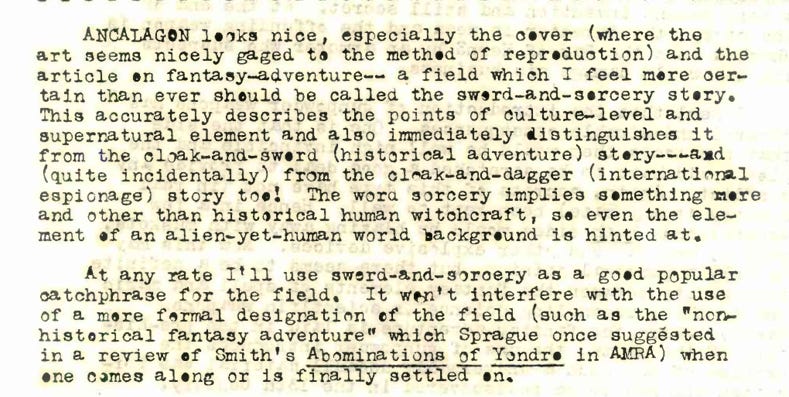
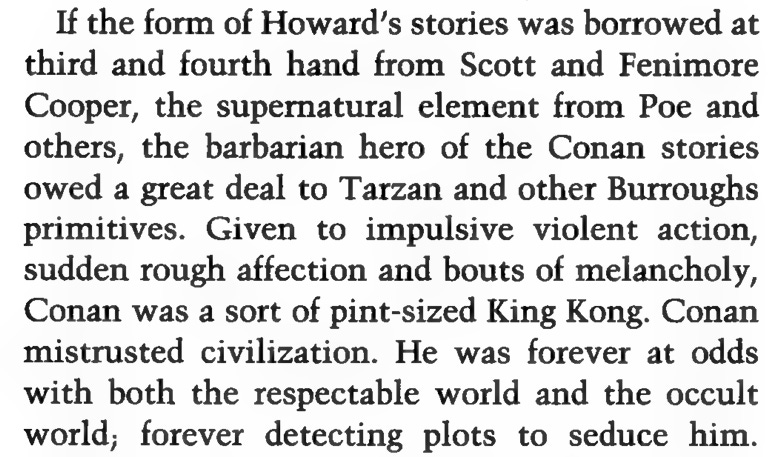
You could call them both “pulp” or “penny dreadfuls,” but fantasy has a sense of wonder presupposing the supernatural, whereas science fiction has a nature of apotheosis, man trying to buck God while simultaneously becoming a god.
Planetary Romance - The Gorean Series by John Norman.
Sword and Sorcery - David Eddings Belgariad, Wiess/Hickman Dragonlance, etc.